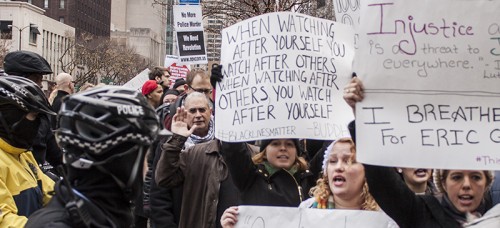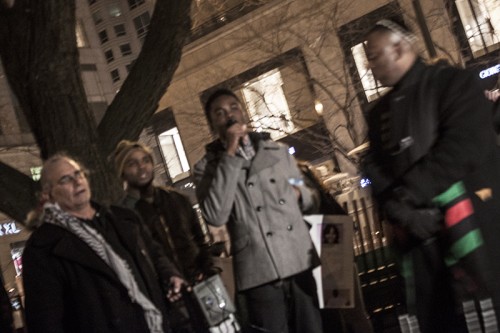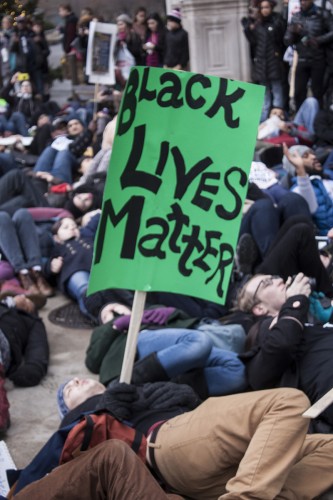
The nation looked on as the indictment decisions for the police officers responsible in the deaths of African-Americans Mike Brown and Eric Gardner came out on Nov. 24 and Dec. 3.
“No indictment.”
Outcry has since ensued from all sides of the issue, as everyday citizens expressed their solidarity with police officers or the African-American community. Protests and demonstrations ensued in December 2014 throughout major locales in the United States, and Chicago was no exception.
Men of Vision and Empowerment (MOVE), a DePaul organization concerned with issues of African-American education, humanization and empowerment, became heavily involved with speaking and organizing during many of the December anti-police violence protests.
The DePaulia interviewed Elijah Obasanya, one of the officers of MOVE, to discuss MOVE’s role in the demonstrations and to gain some insight on topics of discrimination and race relations, which extend even beyond issues of police brutality.

What was MOVE’s role at the police violence protests, and what did you speak about to protesters?
Anonymous sponsored, specifically, the March of Anger and invited us to speak there. (Members of MOVE were featured speakers at this event.) We saw a lot of people there that whom we had been seeing at demonstrations throughout the month of December.
I took a direct approach (when speaking) in that I believe that discrimination is a problem that America and its systems create and perpetuate, affecting a lot of aspects of people’s lives. It’s well researched that people with an African-American name are less likely to be hired. That’s only one of many consequences in the ripple effect that discrimination and stereotyping can create.
When we hear the phrase “Black Lives Matter” we often literally think about “lives,” but it also goes deeper than just that. We have economic structures that don’t often treat people in African-American neighborhoods as “people.” When it comes to things even as simple as groceries we can see problems such as food deserts disproportionately affecting African-Americans.
It really goes beyond just the police issue. No doubt that is a very important issue, but black marginalization goes far beyond that.
Many policies have been proposed to address acts of African-American discrimination, but what can be done to address the actual stereotypes and negative tropes that some hold of African-Americans?
There are many people who really don’t know the full extent of discrimination, and some of them may not want to know. Such people just find it easier to live in a society that appears peaceful, even though we may not be properly addressing some of the negative issues going on. They might say, “Racism is not really happening the way others chalk it up to be,” and might try to justify some of the events going on today through some reasoning different than the acknowledgement that discrimination is still alive and well in society. It’s not necessarily that many people actively participate in acts of discrimination; it’s just that ignorance allows it to continue.
Some may prefer to think that equality exists and that all challenges have been overcome in the modern era. But for African-Americans that’s not the case. For women, that’s not the case. For Latinos, homosexuals and other minority groups, that’s not the case.
I can’t say that there is a concrete answer on how to confront people who remain blissfully ignorant towards such issues of inequality. But taking our role, for example, I hope that by demonstrating publicly and portraying a respectful show of black empowerment, we are confronting some people who may be blind to such issues.

What were your thoughts on the support that the African-American community received from white Americans and other racial groups?
You always have to acknowledge the realities of the situation. The white middle class holds not just a large portion of America’s wealth and power; they’re a huge portion of our total population. It’s definitely great to see support from such groups of people. The thing we liked about that is that it sparks a unity, and African-Americans need that, seeing how we are definitely a numerical minority.
These protests have, in general, brought different groups of people together. In recent history, I can’t say that there have been many instances in which such broad groups of people united for such a focused cause.
We see there are other issues in America such as misogyny, marginalization of Arab Americans or other such issues, and the spirit should extend towards other problems. We’ve obviously received a lot of support from other groups and we need to remember to help other minorities with their endeavors too.
How would you characterize the thoughts that police officers hold regarding these recent demonstrations?
One thing specifically about these African-American demonstrations is that they are not about being “anti-police.” I’ve spoken to quite a few of the police officers who were (at the protests), and some of them admitted to agreeing with what we thought and wished they could join in had it not been for the badge they were wearing.
Police departments impose these expectations on officers where you have to be all-or-nothing in agreement with the forces’ practices. It’s almost like a fraternity comparison — you can’t rat out one of your brothers for wrongdoing, say, if they may have raped somebody. People feel a duty to protect those who are next to them, even though that may perpetuate larger issues.
With the police issue, you can’t be unfairly oriented against police officers; you have to be oriented against the system that perpetuates and permits damaging actions.
What drives me personally — and this is actually very settling to me — is that I think a lot of people have anger but they don’t have hate. There’s a difference here. You can take anger and channel it through love and courage toward change; hatred cannot necessarily be channeled in the same way. Hatred only draws more hatred. So you have to show love for the victims (of police violence), love for others demonstrating and even love for officers in the hope that they may conduct themselves in a better manner and acknowledge their system’s wrongdoings.
The Gardner and Brown decisions seemed to push the brutality problem to the forefront of American discussion. Do you think that these cases and the following public outcry help get us more steps in the correct direction?
These cases are obviously tragic, but I have been really appreciative of the public outcry coming from many steps of life besides just marginalized African-Americans.
I just hope the outcry doesn’t end. The first step is to acknowledge that problems are there, and then you have to move towards solving it. I think it’s safe to say that many more people acknowledge that brutality is actually an important problem, but popular momentum has to be preserved for systemic change to occur.

